theartsdesk Q&A: violinist Vadim Repin | reviews, news & interviews
theartsdesk Q&A: violinist Vadim Repin
theartsdesk Q&A: violinist Vadim Repin
One of the world's great soloists discusses Tchaikovsky, MacMillan and his native Siberia
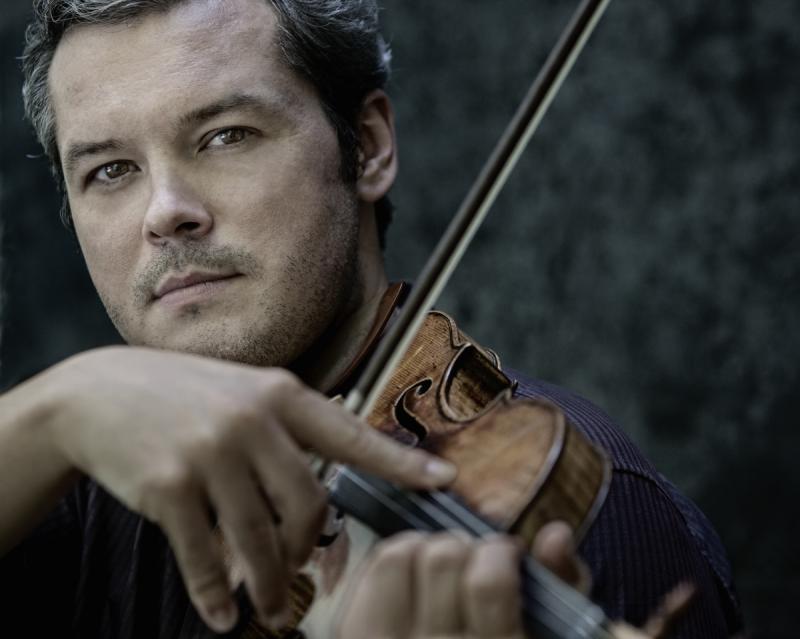
When I last saw Vadim Repin in action, he was premiering a work of terrific energy and invention which is here to stay, James MacMillan's Violin Concerto.
For the full picture, though, his chamber musical collaborations needs acknowledging (although he would insist that he's aiming for chamber music even when he plays the big concertos). And his work with young musicians: I arrived in Lyon too late to catch his masterclasses with students from the Conservatoire the day before our interview. But he was glowing with that, as with so much else, when we met over lunch at his hotel on the banks of the Rhône.
DAVID NICE: So we’re here first and foremost to discuss the Tchaikovsky Concerto performances you’ll be giving in London and Birmingham, though I’m especially intrigued by the contrast with the MacMillan, the difference in approach. Have you counted how often you’ve played the Tchaikovsky?
VADIM REPIN: Well, twice over the past three years. I’ve done it many times before that, of course, it was part of the competitions that I used to enter, and I think for any Russian violinist not only is in a way Tchaikovsky concerto the unavoidable one, it is one of the most beloved, entertaining and satisfactory – your effort is not lost, let’s say. So since this is a special Tchaikovsky season [the 120th anniversary of his death, a fact which had passed me by], I decided to come back to this piece, I played it last month in Paris with the Philharmonia and Ashkenazy, and these will be the second and third times in Birmingham and London.
Simply by not playing a standard repertoire piece for so long is one way. But the contrast between learning a new piece and playing a great masterpiece still interests me: how do you inject new life in the Tchaikovsky?
Some of the time you remove some of the traditions that came through generations by listening, and many youngsters listen to CD and don’t look at the score. What great artists do can be transformative, it always goes in line with the music score. But sometimes the next generation listens and they think, that’s great, and they exaggerate. So you take the score and you start from scratch, let’s say, from the ground up and building you find your way of expressing the beautiful parts, you find the key to the interpretation.
Above all the Tchaikovsky concerto should flow, with its abundance of lyric ideas – great performances make it feel like an improvisation.
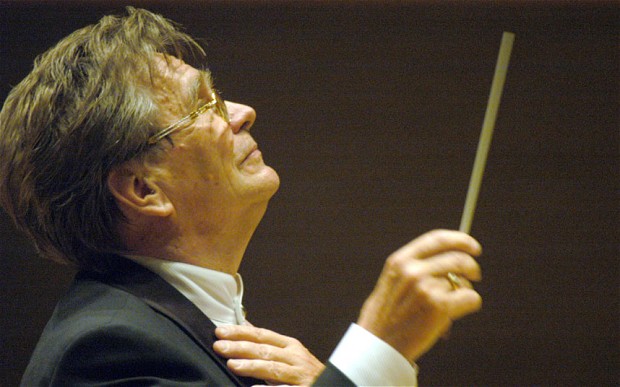 You try to catch the emotional connection with the audience and the players, you give the explosion, and Tchaikovsky is so romantic and touching that usually the music just speaks for itself. So much in my opinion goes in dialogue with the movement and time, so when I work with Fedoseyev (pictured above) and the Tchaikovsky Symphony Orchestra, the pace would be established to create the sense of each movement in one stone, one piece, let’s say. It’s a challenge and we’re trying to build it up in a way that doesn’t feel in little parts, because there’s enough material for many concerti, but that’s also a danger.
You try to catch the emotional connection with the audience and the players, you give the explosion, and Tchaikovsky is so romantic and touching that usually the music just speaks for itself. So much in my opinion goes in dialogue with the movement and time, so when I work with Fedoseyev (pictured above) and the Tchaikovsky Symphony Orchestra, the pace would be established to create the sense of each movement in one stone, one piece, let’s say. It’s a challenge and we’re trying to build it up in a way that doesn’t feel in little parts, because there’s enough material for many concerti, but that’s also a danger.
The only danger it seems to me, is the long first-movement repeat, What do you do with the cadenza, do you just play it as originally written?
There are a couple of passages that [Jascha] Heifetz and [Leopold] Auer made, I use the double stop passages just for the sake of it, doesn’t change the meaning of the cadenza, but it adds some brilliance – that’s my own tradition of playing it.
Do you take the finale always vivacissimo?
That doesn’t take into account that if you go too fast, one cannot any more hear the notes. Of course there are our own tricks how to make not so fast music appear fast. Sheer speed is meaningless. But the little things the orchestra have, for example in the third theme of the finale the double basses’ drone figure usually just gets lost, but if you hear them properly it adds an amazing rush to the heartbeat, to the appearance of the music – it’s quite a work, these little things, for the orchestra and the soloist. Again, it can be so fast but seem to be regular. And vice versa.
You’ve worked with Fedoseyev a lot?
Many times. And over many years.
I haven’t heard him for a long time now live. What would you say are his special qualities?
I think he’s a natural musician, born like that, and he’s been with this orchestra so long, they are as one – they adore him, he loves them, it’s something that’s been developed over so many years that they hardly need to talk to each other, it works as an organism. I think it’s wonderful, and he’s one of the musicians that doesn’t simply follow the soloist. We manage to create a dialogue – it’s also a pleasure for the soloist to take the initiative of the conductor and develop in the right way, answering, continuing. And this concerto is also a bit of a symphony that needs resistance, he has it, for me it’s always a great pleasure. The partnership with Fedoseyev and his orchestra has always been important, we’ve toured many tours in Japan, Europe, America. It’s life together, in a way. Sometimes years go by when we don’t play, then we meet again by destiny, and it’s like this vacuum of time didn’t exist – oh, hello again, from yesterday… and I think that’s a really different feeling with someone you love, and by bonus you can perform together. We always feel ready to share, that’s the key element.
You must experience occasions where you come together and you don’t have a lot of rehearsal time or experience with that conductor. Do you sometimes find it unsatisfactory?
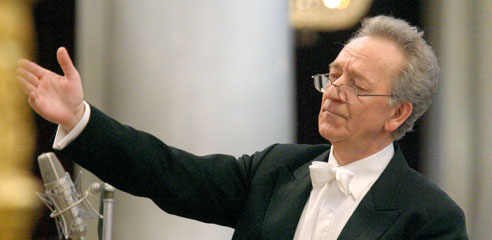 You know Yuri Temirkanov (pictured left), a great maestro, one of my closest friends, before going on stage, we’ve always said, instead of the usual "toi toi toi", "let’s be co-respectful", which means let's create a dialogue.
You know Yuri Temirkanov (pictured left), a great maestro, one of my closest friends, before going on stage, we’ve always said, instead of the usual "toi toi toi", "let’s be co-respectful", which means let's create a dialogue.
Can you think of special occasions with conductors when the music really flew?
Well, it’s supposed to take off every time. But specially so – not often, unfortunately – it’s such a rarity. But in some point you understand you cannot speak, or tears will come – just emotionally. It depends on the constellations combining – the way you feel on the day, how it’s been, the conductor, the public – because the public is such a huge thing. You know how they say in sports, a football team may be only 12 people, but the crowd is part of that team. But to cite examples, I remember once I had an unforgettable concert in New York with Muti – playing Tchaikovsky, actually, I think I was so moved also once by playing the Shostakovich [First] Concerto with Gergiev in Rotterdam with his orchestra there. And I will never forget Prokofiev’s Second Violin Concerto with Temirkanov in St Petersburg, again it felt the size of a planet.
If the artists do not understand each other, it cannot be a memorable performance. If you have to do a concerto with a new orchestra and conductor, it’s a question of how you use the rehearsal time; it’s extremely important to create eye contact, to create these little transitions between key players, not everyone, that’s impossible – but first oboe, horn, flute, the first violins, to make sure they feel as cherished when they have this important material as the soloist. And I think it pays off wonderfully at the concert because it’s like making chamber music, and that for me is the key to a good concert, it doesn’t matter whether there’s five people or five hundred.
The attitude is changing – soloists play more chamber music.
It’s more fun.
And it brings you into even closer contact with people. I know you value chamber music.
Well, it is the best music.
I read that you chose Brahms’ First Violin Sonata as your all time favourite work.
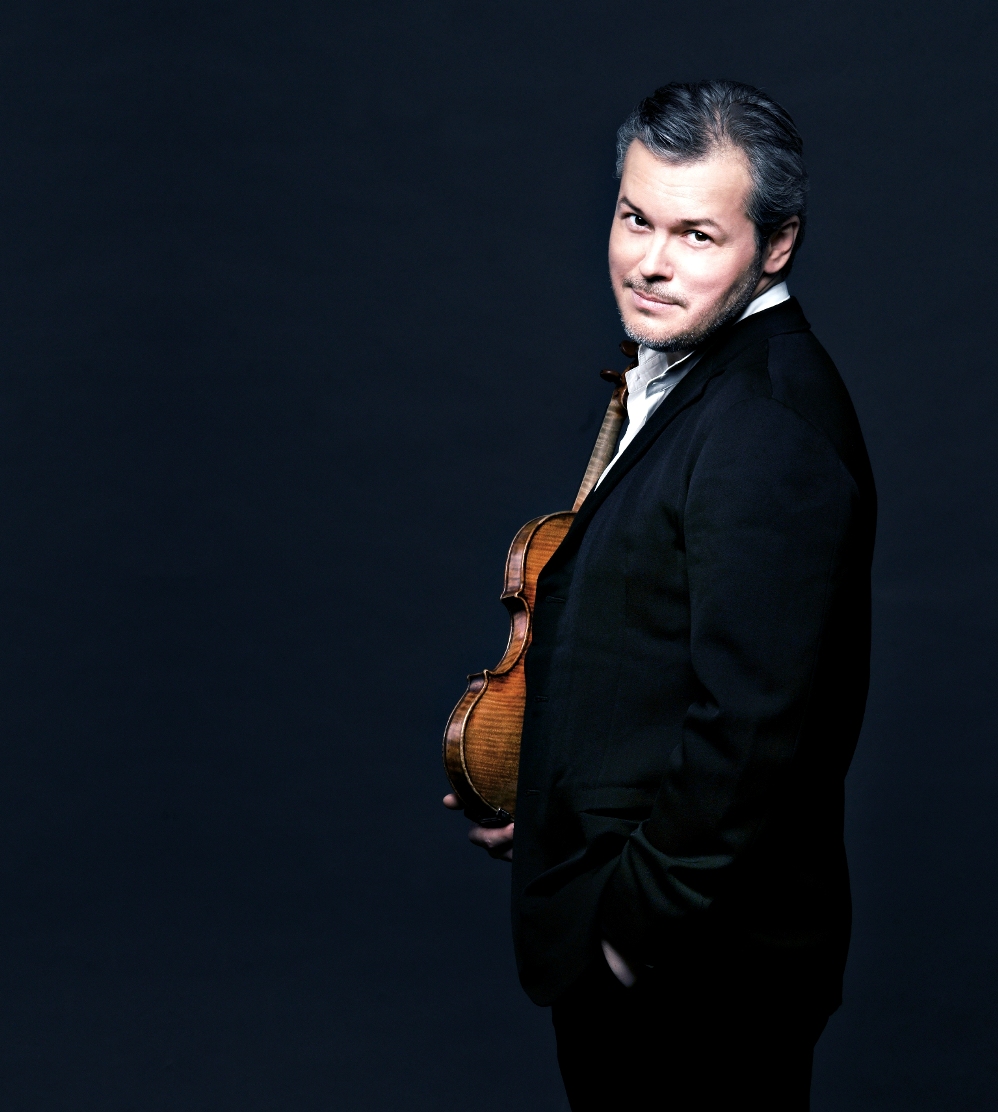 Yes, that’s still true – I have a special feeling for Brahms generally. But if I had to take one piece of music that really kills me in a good way, that would be this sonata – it’s absolute genius.
Yes, that’s still true – I have a special feeling for Brahms generally. But if I had to take one piece of music that really kills me in a good way, that would be this sonata – it’s absolute genius.
And other chamber music?
Oh, I play just about everything (Repin, pictured right by Gela Megelidze). I’ve done Taneyev recently in Hong Kong. Jimmy Lin invited me to make my carte blanche programme of Russian music, we did the Prokofiev Sonata for Two Violins together, and then we had the Taneyev Piano Quintet, I felt so happy – it’s an epic, symphonic chamber piece of music.
His chamber music generally is wonderful. I know Steven Isserlis has been championing Taneyev in London.
Yes, I remember the Piano Quintet with him and Pletnev on the piano at the Wigmore Hall, wonderful.
We don’t really know Russian chamber music as well as we should. I was listening recently to the Arensky piano trios.
Oh, yes [exuberantly sings the opening of the scherzo and trills the piano run].
That reminds me a bit of Fauré.
It’s a bit like a circus, entertaining, salon style. But the chamber music repertoire is endless – you just dig in a little, forget it. We have all night long to just look at the quartets, and you never can perform everything. The more there is, the more interesting for all of us.
Do you play string quartets?
No, it needs to be a family to play it – I mean a family of people who really live together. Anything that has no piano is extremely difficult. So when you set up something for a festival, there are more chances for success if you look at piano trios. I think the piano trio as an idea is to have three personalities and let them talk. Each player has a great solo career – but there must be a piano in the middle. The great quartets invest their life for this art. I do this sometimes, but just for fun with my friends, when we have time, after rehearsing is done – we say, let’s do something else just for fun
Of the other concertos, some stand out, but which are the ones you can keep on playing?
Brahms, Shostakovich One which I’m playing in a week’s time – it’s perfection from first to last note. And of course Sibelius, you cannot live without Sibelius.
Tell me a bit more about the MacMillan Concerto – it must have been a formidably difficult piece to learn?
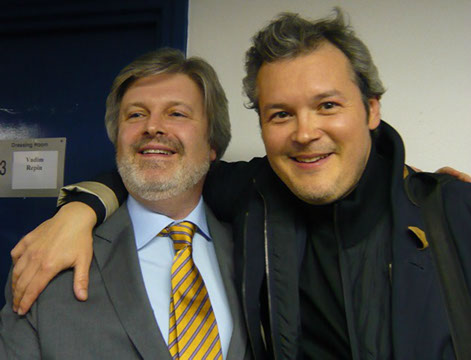 No – it is so beautiful and logical at the same time and powerful. We met with James (the composer and the violinist, pictured left) a few times to rehearse, and not once did I find anything that I would wish to change. It seemed like a clean page with something that immediately took my musical support.
No – it is so beautiful and logical at the same time and powerful. We met with James (the composer and the violinist, pictured left) a few times to rehearse, and not once did I find anything that I would wish to change. It seemed like a clean page with something that immediately took my musical support.
You didn’t have to advise with technique, like Rostropovich did with Prokofiev?
Not at all.
Did he ask to write it for you? He usually has a specific player in mind when he composes a concerto.
It was the idea of the London Symphony Orchestra to co-commission this piece. I only had the benefit that the concerto was written for me and I’m the proud dedicatee. The LSO asked me if I would be interested to do it, and the name of MacMillan for me was quite something, because I heard his music played at the Kirov – I can’t remember the name of the piece, it was a commission by Valery, and he did many things – and I have CDs of his choral music. To me he’s such a truthful composer, and his music backs you up as a performer in the best sense.
With contemporary music you must have to take care, because there are only so many really first rate composers in any generation.
Well, I’m not really in a position to make all the choices, but I have my wishes, and MacMillan was No. 1, that’s for sure. Now I have a beautiful idea with an Israeli composer called Benjamin Yusupov (pictured below with Repin at their first rehearsal together) who’s written a concerto for me, to perform at my festival in Novosibirsk. Extremely interesting: six movements, each one presents a different kind of music – gypsy, Indian, old music of 17th century, jazz improvisation.
Tell me about this festival.
It’s a new thing for me. This year we open a new concert hall, the last point at I thought this is the time to do something together, to try to bring my friends, musicians, dancers [he is married to one of the world’s great ballerinas, Svetlana Zakharova, who was the best Odette I’ve ever seen during her Mariinsky days, and who was dancing Giselle at Moscow’s Bolshoi on the evening of our interview. They will repeat their duo performance, premiered in Switzerland, at the Trans-Siberian Festival]
Will it still be cold in April?
Plus 10, just like now.
I’ve always wanted to experience Siberia in very cold temperatures. What’s it like?
Wonderful! It was minus 28 when I was there two weeks ago, it was OK, and when I arrived in Moscow it was minus 8 and I thought I would freeze to death. It’s a difference of humidity, air, sky, in a way in Siberia it’s a continental climate, it’s not a big deal up to minus 30, which doesn’t happen very often.
You trained in Novosibirsk?
I grew up there until the Queen Elizabeth Competition (the young Repin pictured below).
So Zakhar Bron, your distinguished teacher, was there?
He taught there. That was my luck.
The symphony orchestra is excellent, isn't it, and the Conservatoire has a good reputation.
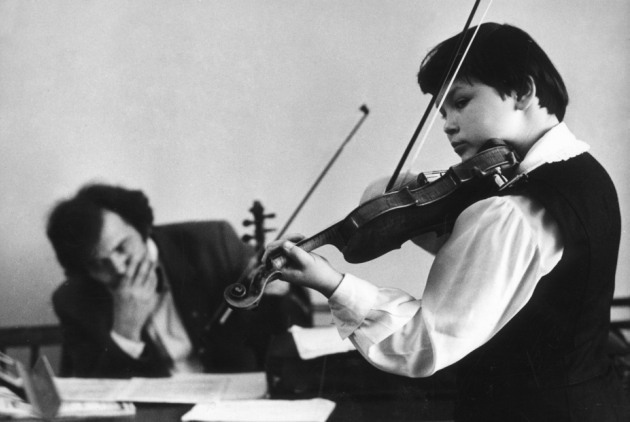 And there are four musical lycees in Novosibirsk, a great opera theatre, seven other theatres, experimental, for children, drama, the circus – it was my dream as a child to go to the circus at least once a month. So the city is spectacular, the third largest in Russia. There are some myths about Siberia – bears walking on the street and playing balalaikas etc – nothing wrong with that. But we want also to put this on the map as something really special. You may not know but there’s a little town inside the city, an academic town, built in the Second World War as a centre for sciences, so it’s a kind of Russian Silicon Valley. With all this culture and science the city is extremely interesting. The cultured public is so appreciative of symphony concerts.
And there are four musical lycees in Novosibirsk, a great opera theatre, seven other theatres, experimental, for children, drama, the circus – it was my dream as a child to go to the circus at least once a month. So the city is spectacular, the third largest in Russia. There are some myths about Siberia – bears walking on the street and playing balalaikas etc – nothing wrong with that. But we want also to put this on the map as something really special. You may not know but there’s a little town inside the city, an academic town, built in the Second World War as a centre for sciences, so it’s a kind of Russian Silicon Valley. With all this culture and science the city is extremely interesting. The cultured public is so appreciative of symphony concerts.
Didn’t [Maxim] Vengerov come from there?
Yes.
How amazing, that two of the world’s greatest violinists should come from the same place. And [Dmitri] Hvorostovsky?
He’s from Krasnoyarsk, nearby.
You know Vengerov?
I must know him – we went to school together. I know his qualities and respect them very much, and the fact that he was born in Novosibirsk made us grow faster.
You mean there was competition?
Of course – we had the same teacher, and we’re almost the same age, he’s two years younger. When someone plays well, the other says, I must play better – that’s good. It’s better than to be a lone wolf out in the provinces. I think now since he stopped for a while he has reached a different state of mind and taste. I like it even more than before.
As you were growing up, who were your violin gods and what do you think of them now?
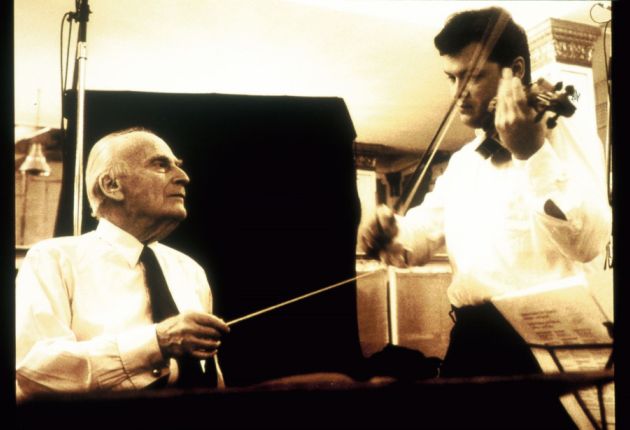 Menuhin (pictured with Repin, left), Kreisler, Oistrakh less, but with my age, more. I like him now much more than when I was younger. That balances out. I don’t know why. Sometimes his playing is not rude enough for me. It’s difficult to criticize Oistrakh, I have no right, I may like him more or less. He’s one of the few whose name will be on the lips of the young generation in another 100 years. I find when I listen to some violin playing – when I was young I would say, oh this is wrong, or how could he play like that – now I have a different approach, oh that must be his idea. I wonder what he was thinking before making this turn, for example. This is always a product of something, and that interests me much more than criticizing.
Menuhin (pictured with Repin, left), Kreisler, Oistrakh less, but with my age, more. I like him now much more than when I was younger. That balances out. I don’t know why. Sometimes his playing is not rude enough for me. It’s difficult to criticize Oistrakh, I have no right, I may like him more or less. He’s one of the few whose name will be on the lips of the young generation in another 100 years. I find when I listen to some violin playing – when I was young I would say, oh this is wrong, or how could he play like that – now I have a different approach, oh that must be his idea. I wonder what he was thinking before making this turn, for example. This is always a product of something, and that interests me much more than criticizing.
So you now understand other temperaments more.
In a way, yes, try to put yourself in his skin and wonder why. Unless someone is low level, then I don’t care – you hear a great sound and approach.
Is there anything left that you specially want to do?
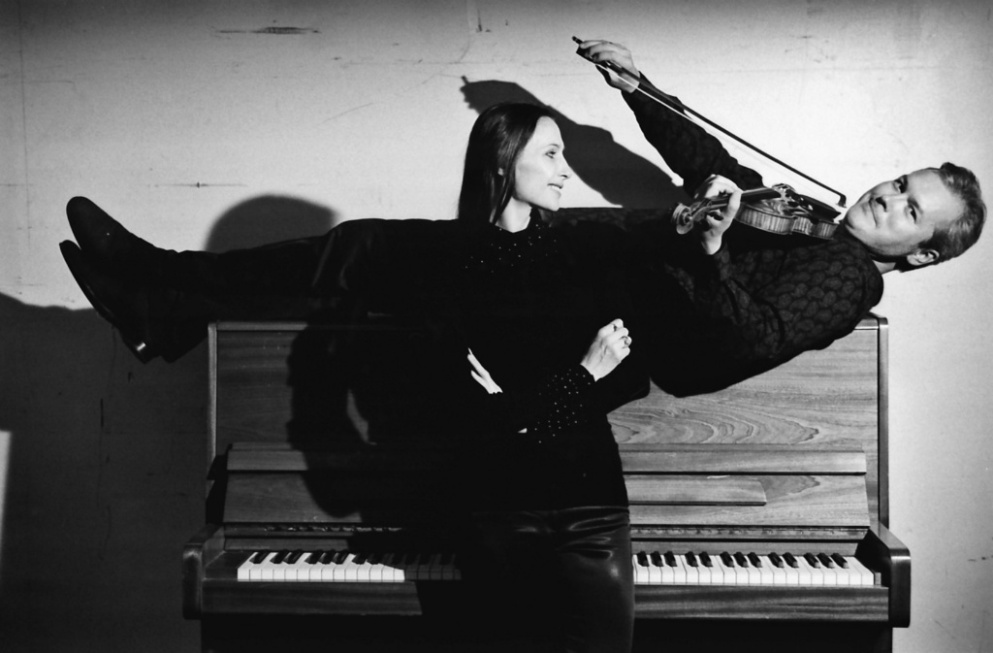 So much! I have dug into only a little part of the repertoire. It depends on your time and pace of life, sometimes you have more energy, sometimes less, sometimes you prefer the real classics, sometimes you search for something new and un-done (Repin, pictured right with his wife, Svetlana Zakharova, by Sasha Gusov). And more education for young musicians. You asked me before about my masterclasses. Nowadays I try to encourage this system, when I come to a symphony orchestra as a soloist, the local conservatoire must profit, so that I can spend time with younger students. You cannot dramatically change the playing, but you can give pleasure discussing new ideas and having a generally positive attitude. In our festival – sorry I talk so much about it, but to me it’s so important – I asked Mario Brunello and Andrei Korobeinikov to give a programme with me with half established artists and half students, we rehearse together, we invite all children – orphans, ill, autistic children, for whom otherwise a visit to a concert would be taboo. This whole idea about the next generation is great. It’s so difficult to gain respect from youngsters. It takes more than playing fast and furious.
So much! I have dug into only a little part of the repertoire. It depends on your time and pace of life, sometimes you have more energy, sometimes less, sometimes you prefer the real classics, sometimes you search for something new and un-done (Repin, pictured right with his wife, Svetlana Zakharova, by Sasha Gusov). And more education for young musicians. You asked me before about my masterclasses. Nowadays I try to encourage this system, when I come to a symphony orchestra as a soloist, the local conservatoire must profit, so that I can spend time with younger students. You cannot dramatically change the playing, but you can give pleasure discussing new ideas and having a generally positive attitude. In our festival – sorry I talk so much about it, but to me it’s so important – I asked Mario Brunello and Andrei Korobeinikov to give a programme with me with half established artists and half students, we rehearse together, we invite all children – orphans, ill, autistic children, for whom otherwise a visit to a concert would be taboo. This whole idea about the next generation is great. It’s so difficult to gain respect from youngsters. It takes more than playing fast and furious.
It’s still so important. When Dudamel gave concerts at the Royal Festival Hall, schools were invited to a week of rehearsals.
It’s a must – in the hall we had students coming to the rehearsals, I went to the conservatoire to teach, this system works – I did it in Montreal, New York, many great cities, and I will continue doing so.
The time is changing at last. And here comes coffee, so that seems a good place to wind up the interview
So the rest is off the record, right?
- Vadim Repin plays the Tchaikovsky Violin Concerto at Symphony Hall Birmingham tonight and London's Royal Festival Hall on Monday
Buy
Share this article
Add comment
The future of Arts Journalism
You can stop theartsdesk.com closing!
We urgently need financing to survive. Our fundraising drive has thus far raised £49,000 but we need to reach £100,000 or we will be forced to close. Please contribute here: https://gofund.me/c3f6033d
And if you can forward this information to anyone who might assist, we’d be grateful.

Subscribe to theartsdesk.com
Thank you for continuing to read our work on theartsdesk.com. For unlimited access to every article in its entirety, including our archive of more than 15,000 pieces, we're asking for £5 per month or £40 per year. We feel it's a very good deal, and hope you do too.
To take a subscription now simply click here.
And if you're looking for that extra gift for a friend or family member, why not treat them to a theartsdesk.com gift subscription?
more Classical music
 Cho, LSO, Pappano, Barbican review - finely-focused stormy weather
Chameleonic Seong-Jin Cho is a match for the fine-tuning of the LSO’s Chief Conductor
Cho, LSO, Pappano, Barbican review - finely-focused stormy weather
Chameleonic Seong-Jin Cho is a match for the fine-tuning of the LSO’s Chief Conductor
 Classical CDs: Shrouds, silhouettes and superstition
Cello concertos, choral collections and a stunning tribute to a contemporary giant
Classical CDs: Shrouds, silhouettes and superstition
Cello concertos, choral collections and a stunning tribute to a contemporary giant
 Appl, Levickis, Wigmore Hall review - fun to the fore in cabaret and show songs
A relaxed evening of light-hearted fare, with the accordion offering unusual colours
Appl, Levickis, Wigmore Hall review - fun to the fore in cabaret and show songs
A relaxed evening of light-hearted fare, with the accordion offering unusual colours
 Lammermuir Festival 2025, Part 2 review - from the soaringly sublime to the zoologically ridiculous
Bigger than ever, and the quality remains astonishingly high
Lammermuir Festival 2025, Part 2 review - from the soaringly sublime to the zoologically ridiculous
Bigger than ever, and the quality remains astonishingly high
 BBC Proms: Ehnes, Sinfonia of London, Wilson review - aspects of love
Sensuous Ravel, and bittersweet Bernstein, on an amorous evening
BBC Proms: Ehnes, Sinfonia of London, Wilson review - aspects of love
Sensuous Ravel, and bittersweet Bernstein, on an amorous evening
 Presteigne Festival 2025 review - new music is centre stage in the Welsh Marches
Music by 30 living composers, with Eleanor Alberga topping the bill
Presteigne Festival 2025 review - new music is centre stage in the Welsh Marches
Music by 30 living composers, with Eleanor Alberga topping the bill
 Lammermuir Festival 2025 review - music with soul from the heart of East Lothian
Baroque splendour, and chamber-ensemble drama, amid history-haunted lands
Lammermuir Festival 2025 review - music with soul from the heart of East Lothian
Baroque splendour, and chamber-ensemble drama, amid history-haunted lands
 BBC Proms: Steinbacher, RPO, Petrenko / Sternath, BBCSO, Oramo review - double-bill mixed bag
Young pianist shines in Grieg but Bliss’s portentous cantata disappoints
BBC Proms: Steinbacher, RPO, Petrenko / Sternath, BBCSO, Oramo review - double-bill mixed bag
Young pianist shines in Grieg but Bliss’s portentous cantata disappoints
 theartsdesk at the Lahti Sibelius Festival - early epics by the Finnish master in context
Finnish heroes meet their Austro-German counterparts in breathtaking interpretations
theartsdesk at the Lahti Sibelius Festival - early epics by the Finnish master in context
Finnish heroes meet their Austro-German counterparts in breathtaking interpretations
 Classical CDs: Sleigh rides, pancakes and cigars
Two big boxes, plus new music for brass and a pair of clarinet concertos
Classical CDs: Sleigh rides, pancakes and cigars
Two big boxes, plus new music for brass and a pair of clarinet concertos
 Waley-Cohen, Manchester Camerata, Pether, Whitworth Art Gallery, Manchester review - premiere of no ordinary violin concerto
Images of maternal care inspired by Hepworth and played in a gallery setting
Waley-Cohen, Manchester Camerata, Pether, Whitworth Art Gallery, Manchester review - premiere of no ordinary violin concerto
Images of maternal care inspired by Hepworth and played in a gallery setting
 BBC Proms: Barruk, Norwegian Chamber Orchestra, Kuusisto review - vague incantations, precise laments
First-half mix of Sámi songs and string things falters, but Shostakovich scours the soul
BBC Proms: Barruk, Norwegian Chamber Orchestra, Kuusisto review - vague incantations, precise laments
First-half mix of Sámi songs and string things falters, but Shostakovich scours the soul

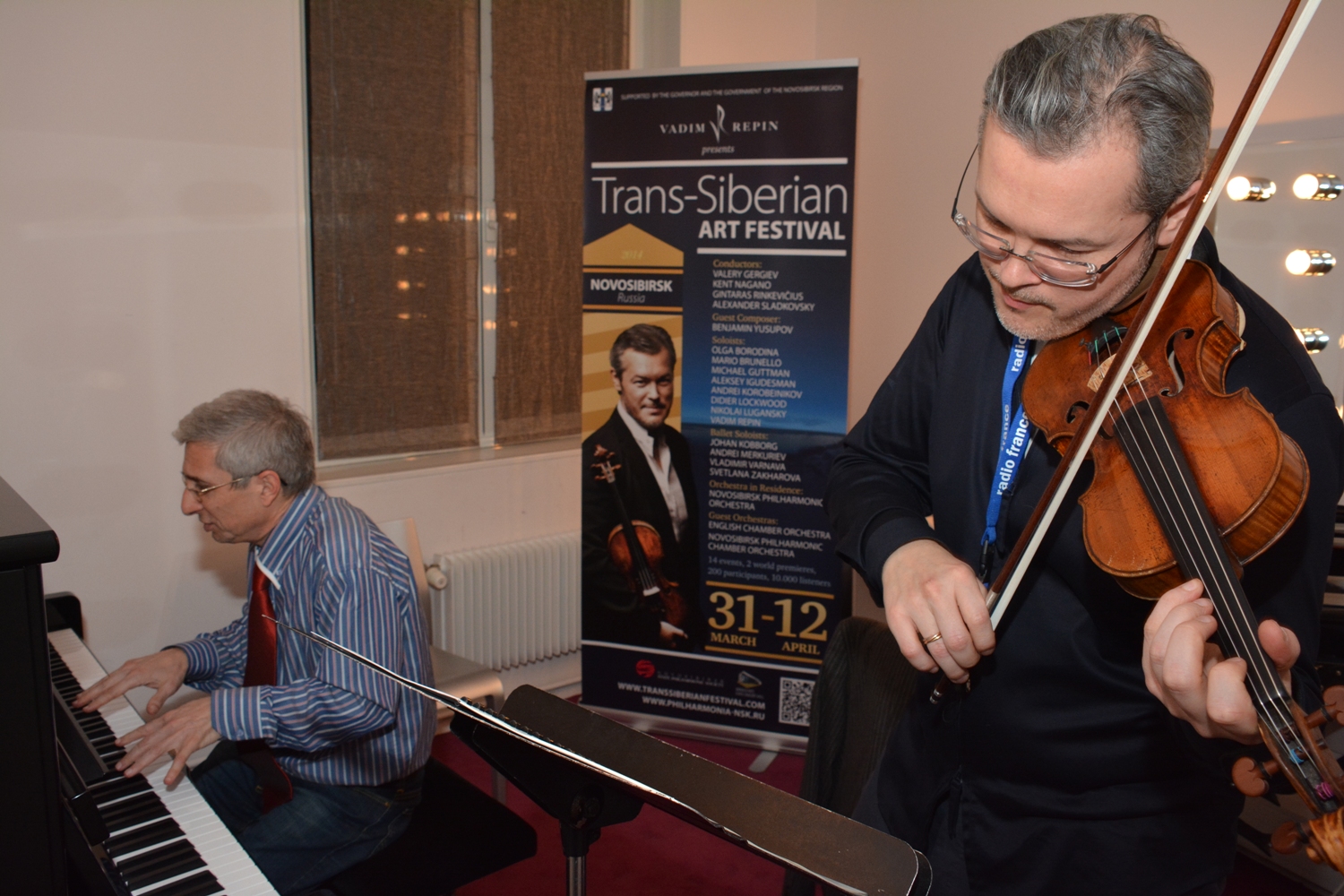
Comments
This interview is so full of